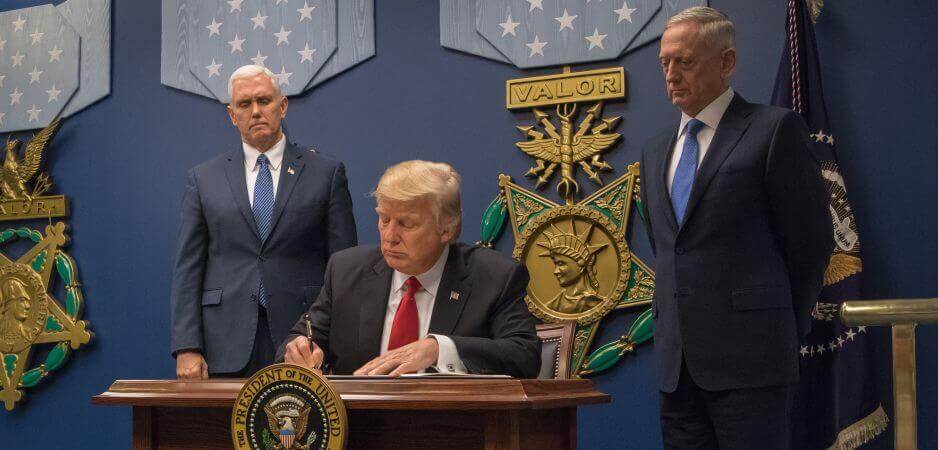Does the appointment of Secretary of Defense James Mattis represent a break with the Obama administration?
The easy confirmation of James Mattis as President Donald Trump’s defense secretary entails no small amount of irony. Senate Democrats perceive the retired Marine general as someone who will speak unvarnished truth to a new White House team they fear will try to insulate Trump from unpalatable news and disagreeable perspectives. But left unremarked upon is that his earlier tenure as head of the US Central Command (CENTCOM), which oversees US military operations in the Middle East, was cut short by the Obama administration for doing precisely that.
By summer 2012, as multilateral talks on Iran’s nuclear ambitions geared up, General Mattis was instructed by his civilian superiors to tone down the weekly assessments he sent to Washington about the destabilizing role Tehran was playing in the Middle East, including its support for terrorism. As a recent Washington Post report notes: “To the White House, these threats were secondary to restricting Iran’s nuclear program, and Mattis’s hard-nosed approach, as outlined in the weekly letters, was seen by some as out of step with the president’s top foreign diplomatic priority.”
By early 2013, tensions between the White House and Mattis had grown such that he was unceremoniously removed from his post. According to The Post, Mattis is convinced that “he had been dismissed early for running afoul of the White House.” Commenting on the event, Thomas E. Ricks, a defense journalist generally sympathetic to the administration, exclaimed at the time: “The message the Obama Administration is sending, intentionally or not, is that it doesn’t like tough, smart, skeptical generals who speak candidly to their civilian superiors.”
Indeed, the charge that the White House was not above squelching dissenting views was voiced regularly even by those who were not among the Obama administration’s conservative critics. Veteran journalist James Mann, for example, noted in his 2012 book, The Obamians, that: “The Obama White House didn’t like independent actors or internal discord. It also didn’t like to be challenged, certainly not in public, and not on the foreign policy issues of greatest sensitivity for Obama.”
Former administration officials have amplified these views. Leon Panetta, who served as Barack Obama’s Central Intelligence Agency (CIA) director and defense secretary, wrote in his recent memoir that the former president’s reliance on senior White House staffers was so heavy that Cabinet members were largely frozen out of the policy formulation and implementation process. Speaking at the Ronald Reagan Presidential Library two years ago, he remarked: “Because of that centralization of authority at the White House, there are too few voices that are being heard … You go there, and by the time you get to the White House, the staff has already decided, or tried to influence, what the direction should be.”
Vali Nasr, who worked on Afghanistan-Pakistan issues in Obama’s first term, offered a scathing critique of policymaking in his 2013 book, The Dispensable Nation. According to Nasr, a phalanx of gatekeepers—or as he called them, a “Berlin Wall of staffers”—operated in the White House, shielding “Obama from any option or idea they did not want him to consider.” He added: “[Furthermore,] the president had a truly disturbing habit of funneling major foreign-policy decisions through a small cabal of relatively inexperienced White House advisors whose turf was strictly politics. Their primary concern was how any action in Afghanistan or the Middle East would play on the nightly news, or which talking point it would give the Republicans.”
Likewise, Rosa Brooks, who served as a political appointee in the Pentagon’s policy shop in Obama’s first term, sounded the alarm in 2012 that the White House national security apparatus was a “tiny fiefdom” and that “dissenting voices are regularly shut out, along with the voices of specialists who could provide valuable information and insights.”
In a subsequent piece, Brooks called attention to the growing tensions between President Obama and his top military advisers. She quoted one retired senior general as saying: “I don’t understand the process by which the White House is making strategic or foreign-policy decisions … There’s an appearance of consultation, but you know you won’t be listened to.”
MATTIS AT CENTCOM
The example made of Mattis provides context to the scandal that emerged at CENTCOM following his removal, when a large group of the command’s intelligence analysts complained that their superiors altered assessments about the Islamic State and al-Qaeda in order to adhere more closely with the Obama administration’s public line that the military campaign against these groups was progressing well. According The Daily Beast, which took the lead in breaking the story in mid-2015, the analysts described a work climate in which “they could not give a candid assessment of the situation in Iraq and Syria. Some felt it was a product of commanders protecting their career advancement by putting the best spin on the war.”
 Following its initial coverage, The Daily Beast subsequently reported that two senior analysts at CENTCOM, including the top expert on Syria, had been ousted from their positions due to judgments casting doubt on the viability of the Obama administration’s plans to arm rebel groups fighting the Bashar al-Assad regime.
Following its initial coverage, The Daily Beast subsequently reported that two senior analysts at CENTCOM, including the top expert on Syria, had been ousted from their positions due to judgments casting doubt on the viability of the Obama administration’s plans to arm rebel groups fighting the Bashar al-Assad regime.
In August 2016, a congressional investigation issued an initial report charging that:
“… structural and management changes made at the CENTCOM Intelligence Directorate starting in mid-2014 resulted in the production and dissemination of intelligence products that were inconsistent with the judgments of many senior, career analysts at CENTCOM. These products were consistently more optimistic regarding the conduct of U.S. military action than that of the senior analysts … [and] was also significantly more optimistic than that of other parts of the Intelligence Community (IC) and typically more optimistic than actual events warranted.”
The report also concluded: “The leadership environment within CENTCOM and its Intelligence Directorate deteriorated significantly following the 2013 departure of Marine General James Mattis and his senior intelligence leaders.”
At his confirmation hearing, Senator Elizabeth Warren told Mattis: “[I]f you end up in this job, our national security may well depend, in part, on your willingness to voice your opinions even when others disagree, even when you are under pressure to remain silent. We are counting on you.” She made the statement seemingly unaware of the irony involved.
The views expressed in this article are the author’s own and do not necessarily reflect Fair Observer’s editorial policy.
Photo Credit: Jim Mattis
Support Fair Observer
We rely on your support for our independence, diversity and quality.
For more than 10 years, Fair Observer has been free, fair and independent. No billionaire owns us, no advertisers control us. We are a reader-supported nonprofit. Unlike many other publications, we keep our content free for readers regardless of where they live or whether they can afford to pay. We have no paywalls and no ads.
In the post-truth era of fake news, echo chambers and filter bubbles, we publish a plurality of perspectives from around the world. Anyone can publish with us, but everyone goes through a rigorous editorial process. So, you get fact-checked, well-reasoned content instead of noise.
We publish 2,500+ voices from 90+ countries. We also conduct education and training programs
on subjects ranging from digital media and journalism to writing and critical thinking. This
doesn’t come cheap. Servers, editors, trainers and web developers cost
money.
Please consider supporting us on a regular basis as a recurring donor or a
sustaining member.
Will you support FO’s journalism?
We rely on your support for our independence, diversity and quality.






